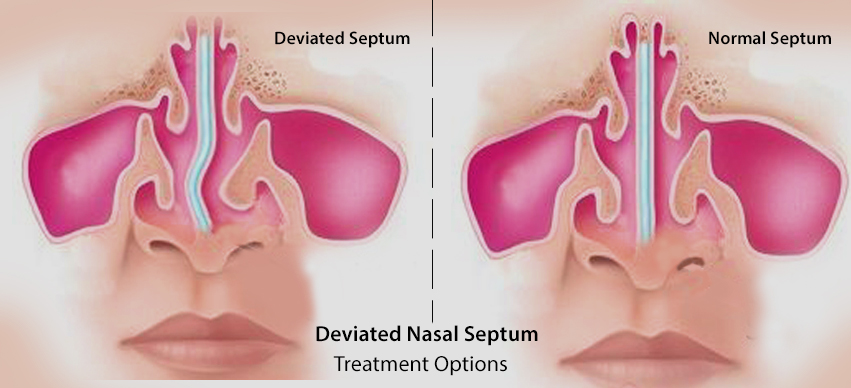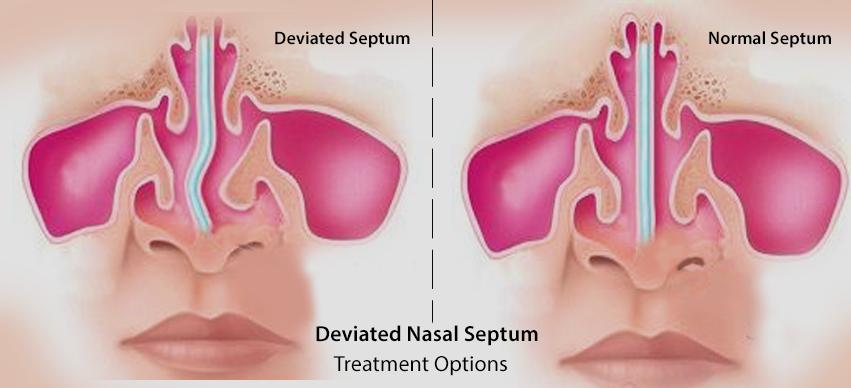Nanoparticle Therapy – An Emerging Cancer Treatment
5 Min Read


The nasal septum is the wall separating the left and right nostrils. The nasal septum is made up of cartilage and bone. If the nasal septum has deviated, one nasal passage would be smaller than the other leading to various symptoms. Symptoms include difficulty breathing, poor sleep, inflammation, nasal congestion and swelling of the nasal lining. Multiple deviated nasal septum treatment options are available to manage the symptoms.
Deviated nasal septum diminishes the quality of life. It decreases the ability to get sound sleep and raises the risk of nosebleed. Facial pain and difficulty breathing are other common nasal septum deviation symptoms. The condition, in general, does not pose any threat to life, thus the treatment options in most cases are intended to reduce the symptoms, resulting in improved health. Symptoms can be lessened by either medication or through natural therapy. In severe cases, when symptoms significantly affect the life of the patient and no relief is witnessed with the medications, surgery is suggested. Following are some of the treatment option available to manage deviated nasal septum:
Medications did not permanently treat this condition but make the patient feel better by alleviating the symptoms. Several medications are used to help patient breath easily and to reduce the related symptoms:
Although not exactly in the category of drugs, the nasal saline spray in one of the common formulations found on almost every prescription having the disease that causes runny nose and nasal congestion. The nasal saline spray keeps the inner nasal environment moist and also improve the activity of cilia. Increased ciliary activity helps expel nasal secretion along with bacteria.
These are the drugs that are used to reduce the nasal secretion and helps to avoid the runny nose and also helps in reducing obstruction. However, it is to be noted that some antihistamines cause drowsiness. Activities requiring immense mental presence, such as driving and working on machines, should be avoided after taking antihistamines.
The nasal steroidal spray is used to reduce inflammation and swelling. This results in reduced nasal obstruction. The steroidal nasal spray takes a few days to achieve effective concentration. Prolonged treatment with steroids should always be carried under the strict guidance of the doctor. Flonase for a deviated septum is prescribed.
Decongestants are the drugs used to reduce swelling in the nasal cavity. This helps the patient in breathing easily. The medications are generally prescribed either in oral form or spray form. Risk of dependency increases with prolonged use of spray decongestants. Further, the symptoms may either return with the same intensity or may be worsened after stopping decongestants. A decongestant may also affect concentration and sleep.
Apart from the medications, natural remedies can decrease the symptoms of the deviated nasal septum. These remedies, either alone or in combination with medications, helps to alleviate the symptoms.
The patient should remain hydrated by drinking a sufficient quantity of water. Increased hydration reduces the swelling and inflammation by releasing the pressure on sinus.
Breathing stem helps reduce inflammation and also helps clear nasal congestion.
Hot liquids such as hot tea, hot coffee, soups, and bone broth help reduce nasal congestion by liquifying nasal mucus.
Warm compress provided relief from various deviated nasal septum symptoms such as inflammation and pain.
The permanent treatment of deviated nasal system is possible through surgery. Mild to moderate symptoms are an effective treatment with the medications and natural remedies, while surgery is kept for the severe condition in which the breath is next to impossible. The surgery done for curing deviated nasal septum is known as septoplasty. The surgery may take about 60-90 minutes depending upon the anatomical adjustment. Septoplasty is conducted under local or general anesthesia.
During the surgery, the incision is made on the side of the nose to get access to the nasal cavity. The position of the septum is corrected and the extra tissues are removed. The patient is allowed to go home the same day of surgery. Pain and swelling are common post-operative manifestations. Although the bandage from the nose is removed after 3-4 days, the complete healing of the nose takes time. Deviated septum surgery recovery is quite slow due to the slow regrowth of cartilage and other tissues.
Deviate nasal septum treatment options involve the method to manage the symptoms or permanently during of disease. Treatment which manages the symptom includes medications such as saline spray, decongestants, antihistamines, and steroids. Natural remedies are also effective in alleviating the symptoms. For curing the condition permanently, septoplasty, a type of surgery for curing deviated nasal septum, is required.